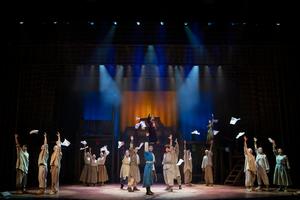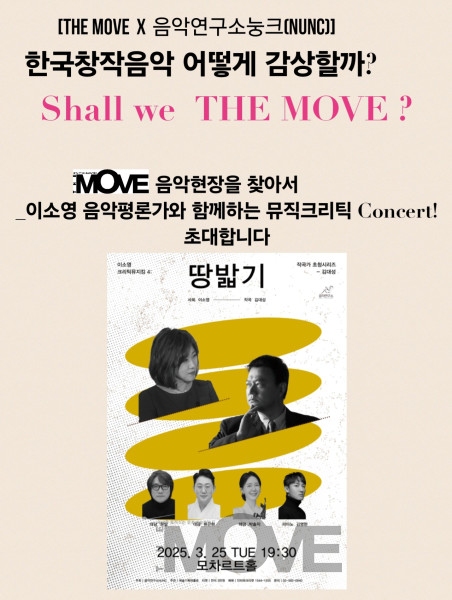 |
초대합니다!
더무브는 새봄과 함께 본격 <슬기로운 음악 탐구생활> 항해를 시작합니다.
첫 출발은 3월 25일 <이소영의 뮤직크리틱 Concert> 입니다.
이소영 음악평론가와 함께 "한국창작음악 어떻게 감상할까?" 에 대한 토크 콘서트 입니다.
이번에는 작곡가 김대성의 작품을 중심으로 이야기 합니다.
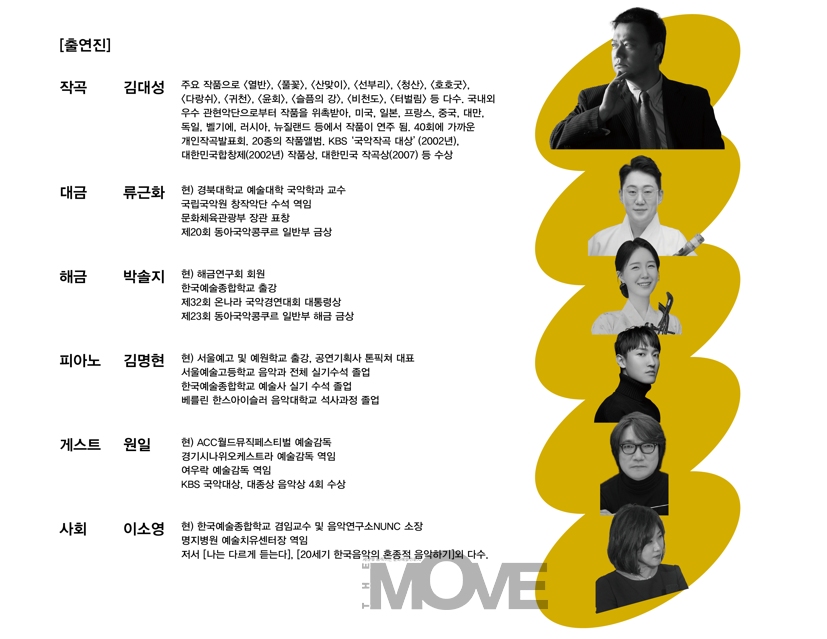 |
많은 참여 바랍니다.
신청은 댓글 혹은 themove99@daum.net
로 해주세요~>![]() ⚘️
⚘️
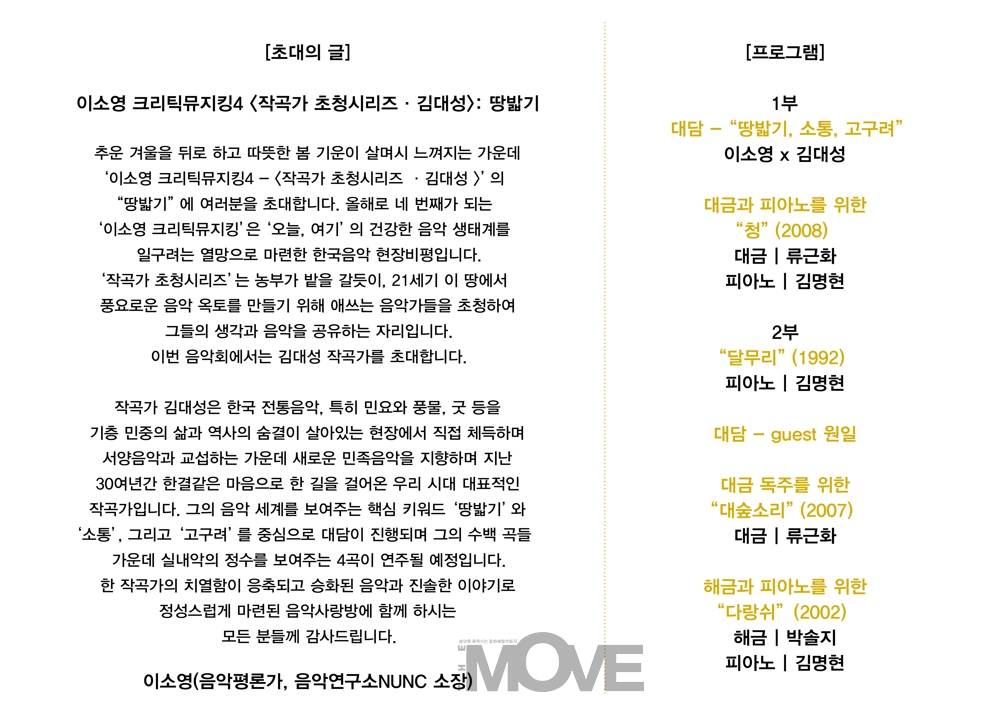 |
- 국악 관현악 ‘금잔디’를 작곡한 김대성은 해방 공간기(1945-1948) 작곡가의 활동에 관심을 갖고 월북 작곡가 리건우의 가곡 ‘금잔디’를 중심으로 지영희의 경기도당굿 중 ‘올림채장단’ 등을 직접 채보하여 소재로 사용, 작품을 완성했다.
- 가곡 '금잔디'는 1948년 발행된 김소월의 시를 가사로 한 리건우의 가곡집 [금잔디] 수록곡 중 하나로, 동시대 활동하였던 작곡가 김순남의 가곡과 함께 해방 공간기 민족음악의 양대 산맥을 이룬다.
- 김대성은 요동지역의 고구려 산성을 답사하던 중 한 송이의 꽃을 발견하고 험난한 역사를 견뎌온 고대의 고구려인과 현대의 민중을 연결하는 매개체로 설정하여 작곡했다. 전반부에서 고구려 산성의 모습과 민족이 겪어온 시련을 굿거리풍의 서정적인 가락으로 표현하고, 후반부에서는 판소리 ‘호걸제’에서 영감을 받아 한민족의 역동적인 힘과 대륙의 기상을 그려낸다.
Korean orchestral piece "Golden Grass" was composed by Kim Dae-seong. Interested in works by Korean composers who had been active from 1945 to 1948 (period following Korea’s liberation from Japanese colonization), Kim composed this work based on “Golden Grass,” a song by Lee Geonwoo who had defected to North Korea. Kim also listened to the rhythm of Gyeonggi Province’s local shaman rite by Ji Young-hee, made a score and added to his work.
“Golden Grass” is a track from Mr. Lee’s album called Golden Grass(1948) comprising songs with words of Kim Sowol’s poems. The song is one of the two greatest Korean ethnic songs of the period after Korea’s liberation, along with a song by composer Kim Soon-nam.
Kim Daeseong was visiting a mountain fortress located in Liaodong, China. The fortress had been built by Goguryeo, one of the three ancient kingdoms of Korea. There, Kim saw a flower which inspired him to compose a piece that connects Goguryeo’s people and today’s public going through ups and downs. In its first half, the piece depicts Goguryeo’s mountain fortress and people’s hardship with a traditional rhythm and lyrical tune. Its second half, which was inspired by a pansori work Hogeolje, expresses Korean people’s dynamic power and their land’s vigor.
* Copyright ⓒ National Orchestra of Korea(NOK) all rights reserved
이수민 기자 Press@ithemove.com
<저작권자 © 월간 더무브 THE MOVE, 무단 전재 및 재배포 금지>

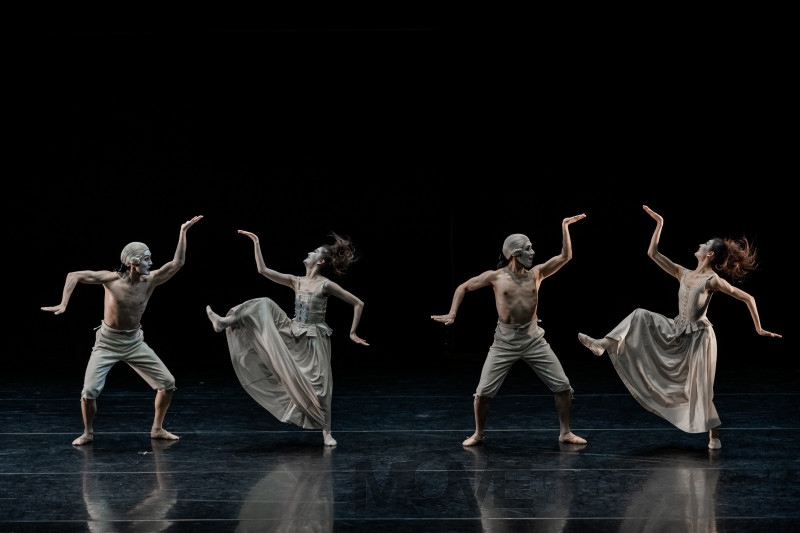 국립발레단, 이어리 킬리안의 현대 발레 대표작 3편 한 무대에
국립발레단, 이어리 킬리안의 현대 발레 대표작 3편 한 무대에
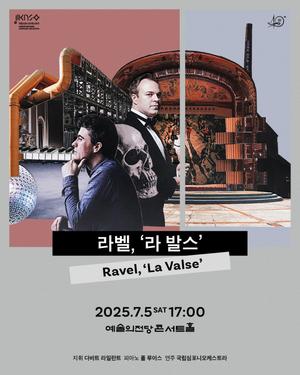
![[L’Opera] 유쾌한 환상과 풍자의 오페라 '세 개의 오렌지에 대한 사랑'](/news/thumbnail/202506/4224_18241_375_v150.jpg)

